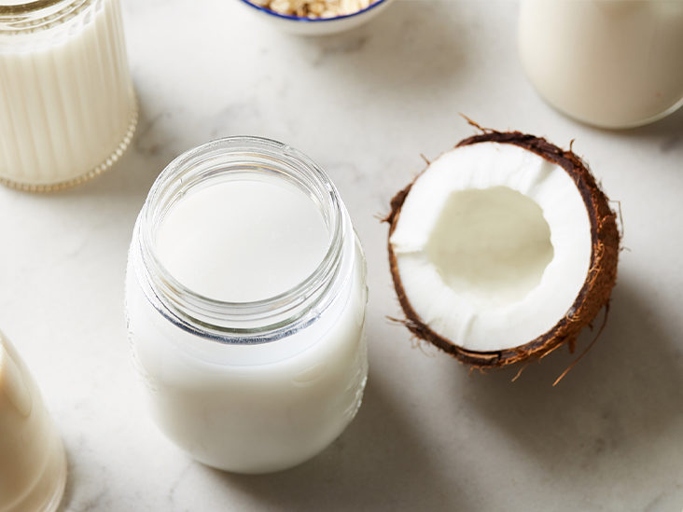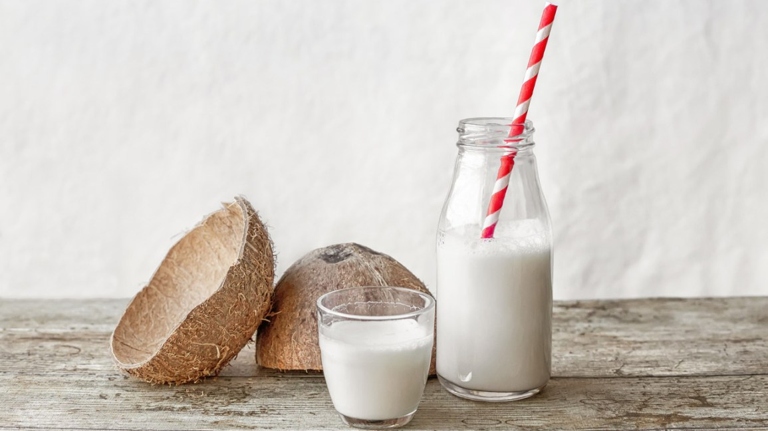If you’ve ever opened a can of coconut milk and found it solid instead of the creamy liquid you were expecting, you’re not alone. Many people have experienced this frustrating phenomenon, but there’s no need to worry. In this article, we’ll explain why coconut milk sometimes solidifies and give you some tips for avoiding it in the future.
Solid Coconut Milk
It could be that you didn’t shake the can before opening it, or that you stored it in a cold environment. If you’re looking to avoid solid coconut milk, make sure to shake the can before opening, and store it in a cool, dry place. There are many reasons why your coconut milk may have solidified.
How Is Coconut Milk Made?
The flesh is first grated and then soaked in hot water. The coconut milk is then strained and cooled. Coconut milk is made by extracting the liquid from the flesh of a mature coconut.

Coconut milk is a popular ingredient in many Asian cuisines and is also used as a dairy-free alternative to cow’s milk. While coconut milk is high in fat, it is also a good source of vitamins and minerals.
Benefits of Coconut Milk
Coconut milk is also a good source of healthy fats, vitamins, and minerals. Coconut milk is a popular plant-based milk alternative that is rich in nutrients and has a variety of health benefits. Unlike cow’s milk, coconut milk is lactose-free, making it a good choice for people with lactose intolerance.
Risks of Coconut Milk
Coconut milk is a popular dairy-free alternative to cow’s milk. However, there are some risks associated with consuming coconut milk. Here are some of the risks of coconut milk:
Symptoms of a coconut milk allergy may include hives, itching, swelling, and difficulty breathing. 1. Allergies: Some people may be allergic to coconut milk.
2. Digestive issues: Coconut milk is high in fat and can cause digestive issues like diarrhea and constipation in some people.

3. Kidney stones: Coconut milk is also high in potassium and can lead to the formation of kidney stones in some people.
4. Interactions with medications: Coconut milk can interact with some medications, such as blood thinners and heart medications.
5. Unhealthy fats: Coconut milk is high in saturated fat, which can raise your cholesterol levels and increase your risk of heart disease.
Recipes Using Coconut Milk
Coconut milk is a delicious, creamy, and healthy alternative to cow’s milk. It’s also a great vegan option. But what do you do when you open a can of coconut milk and find that it’s solid?
The solid part is made up of coconut cream, and the liquid is made up of coconut water. Don’t worry, it’s not spoiled. Coconut milk can separate into a solid and a liquid, and this is perfectly normal.
You can then use it in any recipe that calls for coconut milk. If your coconut milk has separated, simply stir it until it’s combined again.

Here are some delicious recipes that use coconut milk:
Frequently Asked Questions
1. Why is my coconut milk solid?
There are a few reasons why your coconut milk may have solidified. If you store coconut milk in the fridge, the cooler temperature can cause the milk to thicken and solidify. Additionally, if you didn’t shake the coconut milk before opening it, the cream may have separated from the water and risen to the top, causing the milk to solidify.
2. How can I prevent my coconut milk from solidifying?
To prevent your coconut milk from solidifying, store it in a cool, dark place like the fridge and give it a good shake before opening.
3. Can I still use solidified coconut milk?
Yes, you can still use solidified coconut milk. Simply place the container of milk in a bowl of warm water and wait for it to liquify. Once it’s liquid again, give it a good shake and it should be good to use.
4. Will solidified coconut milk taste different?
Solidified coconut milk may have a slightly different texture, but it should still taste the same.
5. I accidentally froze my coconut milk, is it still good to use?
Yes, you can still use frozen coconut milk. Simply thaw it out in the fridge or in a bowl of warm water and give it a good shake before using.
Final thoughts
If you’ve ever opened a can of coconut milk only to find that it’s solid, you’re not alone. Many people don’t realize that coconut milk can separate and solidify, especially if it’s cold. There are a few reasons why this happens, but the good news is that it’s still perfectly safe to drink. So if you find yourself with a can of solid coconut milk, don’t worry – just give it a shake and enjoy.
